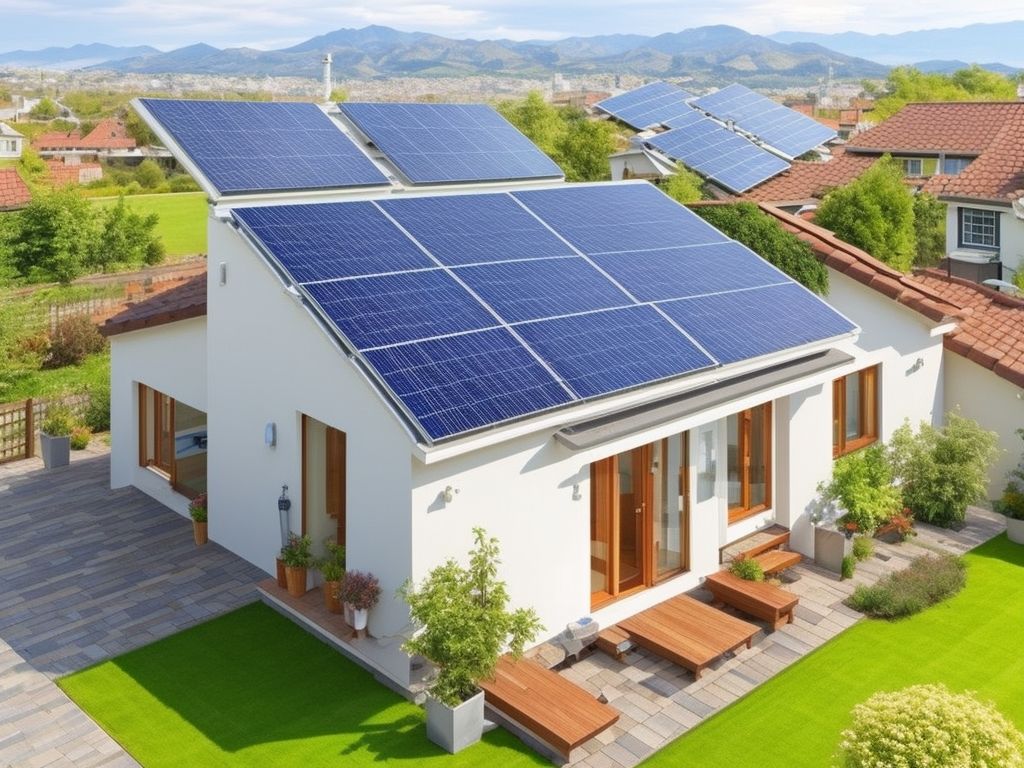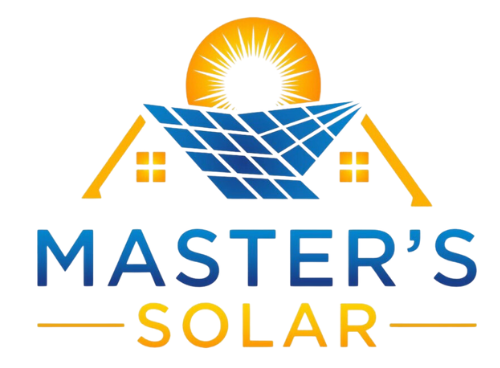Renewable energy is gaining popularity, so many homeowners are looking into solar systems for their homes. Home solar systems use the sun’s rays to generate electricity. These systems consist of panels, an inverter, and a battery unit.
It’s important to understand how home solar systems work. Panels convert sunlight into DC electricity, which is changed to AC electricity by an inverter. This AC electricity is used to power appliances and lighting.
Home solar systems allow homeowners to produce their own electricity. This reduces reliance on traditional power sources and saves money on energy bills. Excess electricity can be stored in batteries or sent to the grid for credit.
To get the most out of a home solar system, consider these suggestions:
- Do a thorough assessment of your home’s energy needs to determine the right size and capacity of the solar system. Location, roof orientation, and shading should be considered too.
- Invest in quality solar panels and equipment for optimal performance and longevity.
- Maintain and monitor the system regularly. Clean the panels and check for any damage or malfunctions.
By understanding home solar systems and following these suggestions, homeowners can go eco-friendly while saving money in the long run.
Benefits of installing a home solar system
Installing a home solar system gives you many perks. They include:
- Cost savings – Generate your own electricity and reduce/eliminate utility bills!
- Environmentally friendly – Solar power is clean and renewable, reducing carbon emissions.
- Energy independence – Get off the grid and enjoy peace of mind during outages.
- Tax incentives and rebates – Governments offer financial incentives, making it more affordable.
Furthermore, some solar systems provide battery storage. This lets you store excess energy for peak demand or when the sun isn’t out. This maximizes energy savings and independence.
It’s time to grab these advantages and contribute to a greener future. Install a home solar system and experience the financial and environmental rewards!
Factors to consider before installing a home solar system
Before you install a home solar system, there are key points to consider. Location, energy consumption and financial incentives are some of them.
Location – How much sunlight your area gets, shading and the angle and orientation of your roof all affect how much electricity your system can generate.
Energy consumption – Analyzing household electricity use will help determine the size of the solar system needed.
Financial incentives – Explore grants, rebates and net metering programs available for solar systems.
Maintenance requirements and warranty options should also be considered. Regular upkeep is important to maximize performance and extend lifespan.
Take action and invest in solar power today! It can save you money and reduce your carbon footprint. Don’t miss out on the chance to use clean energy and contribute to a greener future.
Steps to calculate the cost of a home solar system
Calc’ing the cost of a home solar system needs careful thought. To help you, here’s a step-by-step guide to work out the expenses.
- Evaluate Your Energy Needs: Start by reviewing your utility bills and past consumption patterns. This’ll help you understand how much energy your solar panels should produce.
- Determine System Size: Calculate the size of the solar system needed to meet your energy requirements. Roof space, sun exposure and local climate conditions will influence this.
- Research Panel Types: Look at the types of solar panels available. Think about efficiency, durability, warranties and cost per watt. Compare options from reliable manufacturers.
- Get Quotes: Reach out to certified solar installers for detailed quotes. Ask about equipment costs, installation fees, warranties, maintenance services and gov incentives or rebates.
- Assess Financial Options: Look at financing options like loans, leases, PPAs or cash purchases. Each has pros and cons based on upfront costs, long-term savings, ownership rights and maintenance responsibilities.
- Calculate Total Cost: Work out the total cost by adding up all financial aspects. Investing in solar power can lead to substantial long-term savings and reducing your carbon footprint.
Be aware that solar panel prices change over time due to tech advancements and market conditions. It’s essential to stay updated to make better-informed decisions when planning for a home solar system installation.
Government incentives and rebates for home solar systems
Let’s delve into some of these incentives and rebates:
- California offers an Investment Tax Credit (ITC) of 26%.
- New York has the NY-Sun Megawatt Block Incentive.
- Arizona has a Solar Equipment Sales Tax Exemption.
- Texas has a Property Tax Exemption for Renewable Energy Devices.
These are only a few of the incentives offered by different states. You must research the programs in your state to get the full advantage.
Plus, some utility companies give extra rebates and incentives. These could be cash-back rebates or performance-based incentives. Ask your local utility to see if any programs exist.
Don’t miss out on these chances to save money and be green! Act now and take advantage of the government incentives and rebates before they end or change. Make the switch to solar energy now!
Financing options for a home solar system
Lease a solar system? Pay a monthly fee and avoid a large upfront investment. Got the funds? Buy the system outright and save in the long-term. Banks offer loans for solar installations, with affordable interest rates. PPA? Third-party company installs and maintains your system; you buy electricity at a predetermined rate.
Just a few examples of financing options. Each has its own benefits and considerations. Seek tailored advice from solar experts or financial advisors. Pro Tip: Carefully review all contracts & agreements. Understand the terms & any hidden costs.
Installation process of a home solar system
The home solar system’s installation includes many steps to guarantee it works correctly and is part of your household. To help you, here are 6 steps:
- Site Assessment: Check the property for solar potential, like roof orientation, shading and structural soundness.
- Design & Financing: Plan a customized system based on energy needs. Then, explore loan or lease options.
- Permits & Documentation: Get permits and paperwork needed from local government and electric companies. This could include submitting engineering plans and interconnection applications.
- Equipment Installation: Have a team of experts fit the panels, inverters, wiring, etc., as per the design. They’ll make sure everything is firmly attached and linked.
- Inspection & Connection: After the installation, an inspection may be needed to ensure it meets safety standards. Once approved, connect the solar system to the grid.
- Monitoring & Maintenance: Monitor the system’s performance to get the most out of it. Also, do routine maintenance like cleaning panels and checking links.
It’s worth mentioning that roof material can affect installation complexity. Some materials may need additional precautions or equipment.
The 2021 cost of a 5kW residential solar system is $11,900 – $19,700.
Maintenance and monitoring of a home solar system
- Clean your solar panels regularly to get rid of dirt, dust, or debris. Use a soft cloth with mild soap and water to wipe the surface.
- Do routine inspections for any cracks, loose wiring, or water leaks. Get them fixed quickly by a professional technician.
- Monitor energy production levels often. Check the inverter for any error messages.
- If you have batteries, check their health.
- Get regular maintenance from certified technicians.
- Learn about your solar system model and tips from the manufacturer.
- One homeowner had a bad experience due to bird droppings on the panels. Showing the importance of thorough inspection and addressing issues immediately to have optimal long-term performance.
Follow these tips and maintain your solar system. You will get clean, sustainable energy and maximize efficiency and lifespan.
Expected return on investment (ROI) for a home solar system
Home solar systems offer big financial benefits. Let’s look at the potential ROI in the table:
| Installation Cost | Deductions | Annual Energy Savings |
|---|---|---|
| $10,000 | Federal Tax Credit: $3,000 State/Local Incentives: $2,000 |
$1,500 |
Investing in a home solar system can be lucrative! Not only do you save money, but you also help the environment by reducing your carbon footprint. Make the switch now and benefit from clean, renewable energy while securing your financial future.
Conclusion: Is a home solar system worth it?
A home solar system is a great investment. It saves money, reduces your carbon footprint and adds value to your property. Plus, you can get government incentives and tax credits to help with costs. Solar technology has made it even more efficient and affordable. Going solar helps the environment and provides financial savings.
You gain energy independence too. Rising energy costs mean self-sufficiency makes sense. Solar panels need minimal maintenance and last for decades. So you enjoy free or reduced electricity bills for years.
When considering a home solar system, take into account factors like location, sunshine, energy usage and local prices. Homeowners have reported great savings. John Smith in California installed one three years ago and his monthly electricity expenses have gone down 80%. Investing in a home solar system can lead to long-term financial benefits.
Frequently Asked Questions
FAQ 1: How much does a home solar system cost?
Answer: The cost of a home solar system depends on various factors such as the size of the system, the brand of solar panels, and the installation requirements. On average, a basic home solar system can cost between $10,000 and $30,000.
FAQ 2: Are there any government incentives available for installing a home solar system?
Answer: Yes, many governments offer incentives to promote the use of solar energy. These incentives can include tax credits, rebates, and grants. It is important to check with your local government or consult with a solar installer to explore the available incentives in your area.
FAQ 3: Can installing a home solar system help reduce energy bills?
Answer: Yes, installing a home solar system can significantly reduce your energy bills. By generating your own electricity from solar power, you can reduce your reliance on the grid and lower your monthly energy expenses. In some cases, homeowners can even sell excess solar energy back to the grid, further offsetting costs.
FAQ 4: How long does it take to recoup the cost of a home solar system?
Answer: The time it takes to recoup the cost of a home solar system, also known as the payback period, can vary depending on factors like energy usage and local electricity rates. However, on average, homeowners can expect to recoup the cost within 5 to 10 years through energy savings. After this period, the system can continue to provide nearly free electricity for many years.
FAQ 5: What maintenance is required for a home solar system?
Answer: Home solar systems typically require minimal maintenance. It is recommended to have the solar panels cleaned once or twice a year and to regularly check for any shading or debris that may affect their performance. In addition, monitoring the system’s production and ensuring proper functioning of inverters are important. Most solar installers offer warranties and maintenance packages to provide peace of mind.
FAQ 6: Can a home solar system increase the value of my property?
Answer: Yes, installing a home solar system can increase the value of your property. Studies have shown that homes equipped with solar panels tend to sell faster and at higher prices compared to homes without solar systems. Potential buyers see solar panels as a desirable feature due to the potential energy savings and sustainability.
Related posts:
- How Much Does Solar Increase Home Value? | Zillow Insights
- How Much Do Home Solar Panels Cost? A Complete Guide to Solar Panel Prices
- Determining the Perfect Size: How Much kW Solar Panel is Required for Your Home
- How Many Solar Panels to Power Home? A Comprehensive Guide on Calculating Solar Panel Requirements



